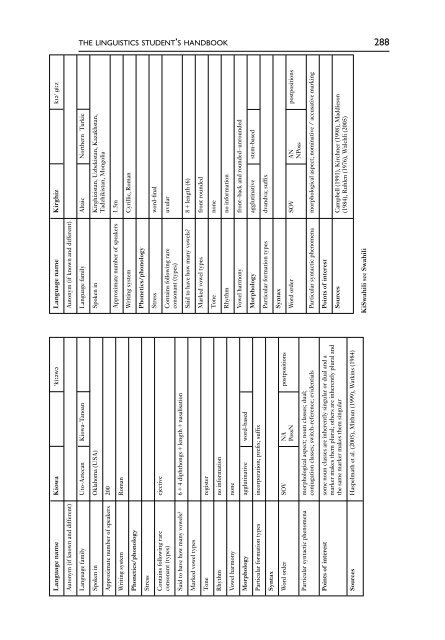- Page 1 and 2:
The Linguistics Student's Handbook
- Page 3 and 4:
‘Laurie Bauer’s Handbook is a t
- Page 5 and 6:
© Laurie Bauer, 2007 Edinburgh Uni
- Page 7 and 8:
THE LINGUISTICS STUDENT’S HANDBOO
- Page 9 and 10:
THE LINGUISTICS STUDENT’S HANDBOO
- Page 12:
Part I: Some fundamentals of lingui
- Page 15 and 16:
THE LINGUISTICS STUDENT’S HANDBOO
- Page 17 and 18:
THE LINGUISTICS STUDENT’S HANDBOO
- Page 19 and 20:
THE LINGUISTICS STUDENT’S HANDBOO
- Page 21 and 22:
THE LINGUISTICS STUDENT’S HANDBOO
- Page 23 and 24:
THE LINGUISTICS STUDENT’S HANDBOO
- Page 25 and 26:
THE LINGUISTICS STUDENT’S HANDBOO
- Page 27 and 28:
THE LINGUISTICS STUDENT’S HANDBOO
- Page 29 and 30:
THE LINGUISTICS STUDENT’S HANDBOO
- Page 31 and 32:
THE LINGUISTICS STUDENT’S HANDBOO
- Page 33 and 34:
THE LINGUISTICS STUDENT’S HANDBOO
- Page 35 and 36:
THE LINGUISTICS STUDENT’S HANDBOO
- Page 37 and 38:
THE LINGUISTICS STUDENT’S HANDBOO
- Page 39 and 40:
THE LINGUISTICS STUDENT’S HANDBOO
- Page 41 and 42:
THE LINGUISTICS STUDENT’S HANDBOO
- Page 43 and 44:
THE LINGUISTICS STUDENT’S HANDBOO
- Page 45 and 46:
THE LINGUISTICS STUDENT’S HANDBOO
- Page 47 and 48:
THE LINGUISTICS STUDENT’S HANDBOO
- Page 49 and 50:
THE LINGUISTICS STUDENT’S HANDBOO
- Page 51 and 52:
THE LINGUISTICS STUDENT’S HANDBOO
- Page 53 and 54:
THE LINGUISTICS STUDENT’S HANDBOO
- Page 55 and 56:
THE LINGUISTICS STUDENT’S HANDBOO
- Page 57 and 58:
THE LINGUISTICS STUDENT’S HANDBOO
- Page 59 and 60:
THE LINGUISTICS STUDENT’S HANDBOO
- Page 61 and 62:
THE LINGUISTICS STUDENT’S HANDBOO
- Page 63 and 64:
THE LINGUISTICS STUDENT’S HANDBOO
- Page 65 and 66:
THE LINGUISTICS STUDENT’S HANDBOO
- Page 67 and 68:
THE LINGUISTICS STUDENT’S HANDBOO
- Page 69 and 70:
THE LINGUISTICS STUDENT’S HANDBOO
- Page 71 and 72:
THE LINGUISTICS STUDENT’S HANDBOO
- Page 73 and 74:
THE LINGUISTICS STUDENT’S HANDBOO
- Page 75 and 76:
11 Binarity Binarity is, in effect,
- Page 77 and 78:
THE LINGUISTICS STUDENT’S HANDBOO
- Page 79 and 80:
12 Trees It is a fundamental of lin
- Page 81 and 82:
THE LINGUISTICS STUDENT’S HANDBOO
- Page 83 and 84:
THE LINGUISTICS STUDENT’S HANDBOO
- Page 85 and 86:
THE LINGUISTICS STUDENT’S HANDBOO
- Page 87 and 88:
14 Native speaker The native speake
- Page 89 and 90:
THE LINGUISTICS STUDENT’S HANDBOO
- Page 91 and 92:
THE LINGUISTICS STUDENT’S HANDBOO
- Page 93 and 94:
THE LINGUISTICS STUDENT’S HANDBOO
- Page 95 and 96:
THE LINGUISTICS STUDENT’S HANDBOO
- Page 97 and 98:
THE LINGUISTICS STUDENT’S HANDBOO
- Page 99 and 100:
THE LINGUISTICS STUDENT’S HANDBOO
- Page 101 and 102:
THE LINGUISTICS STUDENT’S HANDBOO
- Page 103 and 104:
THE LINGUISTICS STUDENT’S HANDBOO
- Page 106 and 107:
16 Notational conventions Linguisti
- Page 108 and 109:
97 NOTATIONAL CONVENTIONS Given the
- Page 110 and 111:
99 NOTATIONAL CONVENTIONS (. ..) Th
- Page 112 and 113:
101 NOTATIONAL CONVENTIONS use it a
- Page 114 and 115:
103 NOTATIONAL CONVENTIONS Table 16
- Page 116 and 117:
105 FREQUENT ABBREVIATIONS AND INIT
- Page 118 and 119:
18 Terminology: ambiguity There are
- Page 120 and 121:
109 TERMINOLOGY: AMBIGUITY Table 18
- Page 122 and 123:
111 TERMINOLOGY: AMBIGUITY Table 18
- Page 124 and 125:
113 TERMINOLOGY: AMBIGUITY Table 18
- Page 126 and 127:
115 TERMINOLOGY: AMBIGUITY Table 18
- Page 128 and 129:
117 TERMINOLOGY: SYNONYMY Table 19.
- Page 130 and 131:
119 TERMINOLOGY: SYNONYMY Table 19.
- Page 132 and 133:
121 TERMINOLOGY: SYNONYMY Table 19.
- Page 134:
123 TERMINOLOGY: SYNONYMY Table 19.
- Page 138 and 139:
20 The International Phonetic Assoc
- Page 140 and 141:
129 THE INTERNATIONAL PHONETIC ASSO
- Page 142 and 143:
21 Reading phonetics and phonology
- Page 144 and 145:
133 READING PHONETICS AND PHONOLOGY
- Page 146 and 147:
135 READING PHONETICS AND PHONOLOGY
- Page 148 and 149:
22 Foreign expressions Although few
- Page 150 and 151:
23 Letters, accents and diacritics
- Page 152 and 153:
141 LETTERS, ACCENTS AND DIACRITICS
- Page 154 and 155:
143 JOURNALS Table 24.1 Linguistics
- Page 156 and 157:
145 JOURNALS Table 24.1 continued L
- Page 158 and 159:
25 Linguists’ names It can someti
- Page 160 and 161:
149 LINGUISTS’ NAMES Table 25.1 c
- Page 162 and 163:
151 LAWS AND PRINCIPLES An anaphor
- Page 164 and 165:
153 LAWS AND PRINCIPLES Head Moveme
- Page 166 and 167:
155 LAWS AND PRINCIPLES Neogrammari
- Page 168 and 169:
157 LAWS AND PRINCIPLES Sapir-Whorf
- Page 170 and 171:
159 LAWS AND PRINCIPLES Verner’s
- Page 172 and 173:
161 LAWS AND PRINCIPLES Kiparsky, P
- Page 174 and 175:
163 STATISTICS in British English,
- Page 176 and 177:
165 STATISTICS means giving a known
- Page 178 and 179:
167 STATISTICS numbers do not add u
- Page 180 and 181:
169 STATISTICS in twenty. So p < 0.
- Page 182 and 183:
28 Some on-line resources for lingu
- Page 184:
173 SOME ON-LINE RESOURCES FOR LING
- Page 188 and 189:
29 Essay writing Many of the assign
- Page 190 and 191:
179 ESSAY WRITING for your sections
- Page 192 and 193:
181 ESSAY WRITING 4.3 Affricate 4.4
- Page 194 and 195:
183 ESSAY WRITING theses, it is pro
- Page 196 and 197:
30 Glosses Glosses are the interlin
- Page 198 and 199:
187 GLOSSES There are standard list
- Page 200 and 201:
189 GLOSSES References Foley, Willi
- Page 202 and 203:
191 USE VERSUS MENTION (3) The suff
- Page 204 and 205:
193 REIFICATION Turns of phrase lik
- Page 206 and 207:
33 Spelling As linguists we know th
- Page 208:
Part V: Bibliographies
- Page 211 and 212:
THE LINGUISTICS STUDENT’S HANDBOO
- Page 213 and 214:
THE LINGUISTICS STUDENT’S HANDBOO
- Page 215 and 216:
THE LINGUISTICS STUDENT’S HANDBOO
- Page 217 and 218:
THE LINGUISTICS STUDENT’S HANDBOO
- Page 219 and 220:
35 Reference lists Reference lists
- Page 221 and 222:
THE LINGUISTICS STUDENT’S HANDBOO
- Page 223 and 224:
THE LINGUISTICS STUDENT’S HANDBOO
- Page 225 and 226:
THE LINGUISTICS STUDENT’S HANDBOO
- Page 227 and 228:
THE LINGUISTICS STUDENT’S HANDBOO
- Page 229 and 230:
THE LINGUISTICS STUDENT’S HANDBOO
- Page 232 and 233:
Language file In this last part of
- Page 234 and 235:
223 LANGUAGE FILE the initial aspir
- Page 236 and 237:
225 LANGUAGE FILE Marked vowel type
- Page 238 and 239:
227 LANGUAGE FILE Points of interes
- Page 240 and 241:
229 LANGUAGE FILE Language name Ain
- Page 242 and 243:
231 LANGUAGE FILE Language name Amh
- Page 244 and 245:
233 LANGUAGE FILE Language name Ara
- Page 246 and 247:
235 LANGUAGE FILE Language name Arr
- Page 248 and 249: 237 LANGUAGE FILE Language name Ben
- Page 250 and 251: 239 LANGUAGE FILE Language name Bon
- Page 252 and 253: 241 LANGUAGE FILE Language name Bur
- Page 254 and 255: 243 LANGUAGE FILE Language name Can
- Page 256 and 257: 245 LANGUAGE FILE Language name Cat
- Page 258 and 259: 247 LANGUAGE FILE Language name Chi
- Page 260 and 261: 249 LANGUAGE FILE Language name Chu
- Page 262 and 263: 251 LANGUAGE FILE Language name Cro
- Page 264 and 265: 253 LANGUAGE FILE Language name Dan
- Page 266 and 267: 255 LANGUAGE FILE Language name Din
- Page 268 and 269: 257 LANGUAGE FILE Language name Dyi
- Page 270 and 271: 259 LANGUAGE FILE Language name Err
- Page 272 and 273: 261 LANGUAGE FILE Language name Ewe
- Page 274 and 275: 263 LANGUAGE FILE Language name Fin
- Page 276 and 277: 265 LANGUAGE FILE Language name Ful
- Page 278 and 279: 267 LANGUAGE FILE Language name Geo
- Page 280 and 281: 269 LANGUAGE FILE Language name Gre
- Page 282 and 283: 271 LANGUAGE FILE Language name Guu
- Page 284 and 285: 273 LANGUAGE FILE Language name Hau
- Page 286 and 287: 275 LANGUAGE FILE Language name Hin
- Page 288 and 289: 277 LANGUAGE FILE Language name Hun
- Page 290 and 291: 279 LANGUAGE FILE Language name Ilo
- Page 292 and 293: 281 LANGUAGE FILE Language name Jac
- Page 294 and 295: 283 LANGUAGE FILE Language name Kam
- Page 296 and 297: 285 LANGUAGE FILE Language name Kar
- Page 300 and 301: 289 LANGUAGE FILE Language name Kob
- Page 302 and 303: 291 LANGUAGE FILE Language name Kor
- Page 304 and 305: 293 LANGUAGE FILE Language name Kwa
- Page 306 and 307: 295 LANGUAGE FILE Language name Len
- Page 308 and 309: 297 LANGUAGE FILE Language name Mac
- Page 310 and 311: 299 LANGUAGE FILE Language name Mal
- Page 312 and 313: 301 LANGUAGE FILE Language name Mam
- Page 314 and 315: 303 LANGUAGE FILE Language name Mar
- Page 316 and 317: 305 LANGUAGE FILE Language name Mei
- Page 318 and 319: 307 LANGUAGE FILE Language name Mix
- Page 320 and 321: 309 LANGUAGE FILE Language name Nah
- Page 322 and 323: 311 LANGUAGE FILE Language name Ndy
- Page 324 and 325: 313 LANGUAGE FILE Language name Niu
- Page 326 and 327: 315 LANGUAGE FILE Language name Nor
- Page 328 and 329: 317 LANGUAGE FILE Language name Oro
- Page 330 and 331: 319 LANGUAGE FILE Language name Pan
- Page 332 and 333: 321 LANGUAGE FILE Language name Pim
- Page 334 and 335: 323 LANGUAGE FILE Language name Pom
- Page 336 and 337: 325 LANGUAGE FILE Language name Qui
- Page 338 and 339: 327 LANGUAGE FILE Language name Rom
- Page 340 and 341: 329 LANGUAGE FILE Language name Sam
- Page 342 and 343: 331 LANGUAGE FILE Language name Ser
- Page 344 and 345: 333 LANGUAGE FILE Language name Sin
- Page 346 and 347: 335 LANGUAGE FILE Language name Slo
- Page 348 and 349:
337 LANGUAGE FILE Language name Spa
- Page 350 and 351:
339 LANGUAGE FILE Language name Swa
- Page 352 and 353:
341 LANGUAGE FILE Language name Tak
- Page 354 and 355:
343 LANGUAGE FILE Language name Tha
- Page 356 and 357:
345 LANGUAGE FILE Language name Tiw
- Page 358 and 359:
347 LANGUAGE FILE Language name Tok
- Page 360 and 361:
349 LANGUAGE FILE Language name Tru
- Page 362 and 363:
351 LANGUAGE FILE Language name Tur
- Page 364 and 365:
353 LANGUAGE FILE Language name Tzo
- Page 366 and 367:
355 LANGUAGE FILE Language name Uru
- Page 368 and 369:
357 LANGUAGE FILE Language name War
- Page 370 and 371:
359 LANGUAGE FILE Language name Wel
- Page 372 and 373:
361 LANGUAGE FILE Language name Wol
- Page 374 and 375:
363 LANGUAGE FILE Language name Yid
- Page 376 and 377:
365 LANGUAGE FILE Language name Zap
- Page 378 and 379:
367 LANGUAGE FILE Language name !X
- Page 380 and 381:
369 LANGUAGE FILE Bauer, Winifred (
- Page 382 and 383:
371 LANGUAGE FILE Crazzolara, J. P.
- Page 384 and 385:
373 LANGUAGE FILE Gruzdeva, Ekatari
- Page 386 and 387:
375 LANGUAGE FILE Klamer, Marian (2
- Page 388 and 389:
377 LANGUAGE FILE Mintz, Malcolm W.
- Page 390 and 391:
379 LANGUAGE FILE Rothstein, Robert
- Page 392 and 393:
381 LANGUAGE FILE Wälchli, Bernhar
- Page 394 and 395:
383 INDEX cliché, 13 closed class,
- Page 396 and 397:
385 INDEX micron, 140 minimal pair,
- Page 398:
387 INDEX theta-criterion, 158 thor



